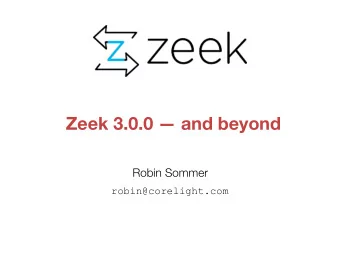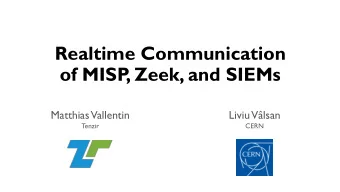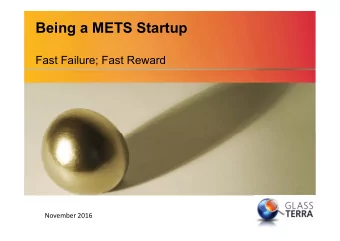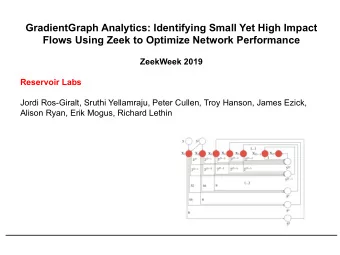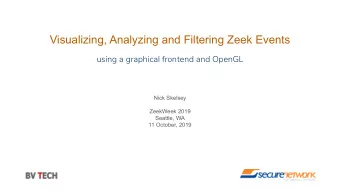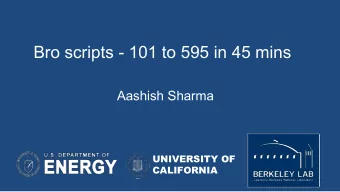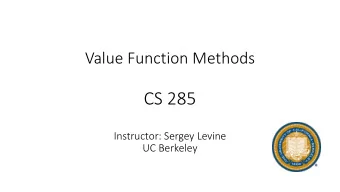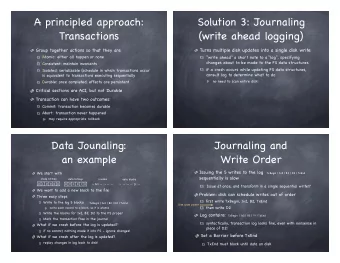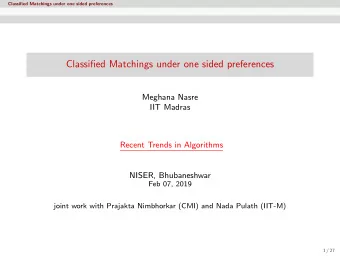
How FAST can Zeek RUN? ZeekWeek 2019 Jim Mellander Seattle WA - PowerPoint PPT Presentation
Run, Zeek, RUN! How FAST can Zeek RUN? ZeekWeek 2019 Jim Mellander Seattle WA Cybersecurity Engineer October 11, 2019 ESNet Goals for this presentation The Quest for Efficiency started Long Ago Can Zeek run faster without code
Run, Zeek, RUN! How FAST can Zeek RUN? ZeekWeek 2019 Jim Mellander Seattle WA Cybersecurity Engineer October 11, 2019 ESNet
Goals for this presentation • The Quest for Efficiency started Long Ago • Can Zeek run faster without code changes? – Yes! • Trying a different compiler • Rolling your own library • Benchmarks • Suggestions 2 10/8/19
Optimization is not a new idea 3 10/8/19
Optimization is not a new idea 4 10/8/19
Modern Code Optimization • Compiler has to make number of decisions – Is “ then ” more probable than “ else ”? – Is a function worth inlining here? – Should this loop be unrolled? • Questions get down to branch probability assessment – Usually estimated by a number of heuristics • Loop exit condition usually estimated false, for instance 5 10/8/19
Several ways to optimize Code Branches • Manual – Then: Fortran’s FREQUENCY statement providing hints for basic blocks. – Now: GCC’s __builtin_expect() function, used by likely() and unlikely() macros in the Linux kernel. – However: “(...) programmers are notoriously bad at predicting how their programs actually perform.” - GCC Manual • Automated – Measure frequency of branches (not)taken during real workload execution. – Use gathered statistics to provide compiler hints. 6 10/8/19
Switch Statement switch(tcp_flag) { if (tcp_flag == SYN) case SYN: do_syn(); do_syn(); else if (tcp_flag == FIN) break; do_fin(); case FIN: else if (tcp_flag == ACK) do_fin(); do_ack(); break; case ACK: else do_ack(); do_something_else(); break; default: do_something_else(); } 7 10/8/19
Most common TCP flag seen in traffic? “(...) programmers are notoriously bad at predicting how their programs actually perform.” • But it ’ s a good bet that ACK is the most common flag seen in actual traffic. – So, to optimize the tests manually, we would want something like: • if (tcp_flag != ACK) goto NOTACK; /* Process ACK Flag */ MAINLINE: /* Continue with mainline of program */ .. NOTACK: /* Test for 2 nd most common flag */ if (tcp_flag != FIN) goto NOTFIN; /* Process FIN Flag */ goto MAINLINE; NOTFIN: etc. 8 10/8/19
Automated Optimization aka Profile Guided Optimization • Compile code with hooks to gather statistics on branches taken/not taken. • Run code against representative sample input, which gathers statistics. • Recompile code using gathered statistics to optimize branches. 9 10/8/19
Who uses Profile Guided Optimization? • Firefox – Page rendering time: 13% faster. • Chrome – Startup time: 16.8% faster. – Page load time: 5.9% faster. – New tab page load time: 14.8% faster. • Python – Up to 20% faster. • PHP – 7% faster. • Zeek? 10 10/8/19
Cliff Notes: Profile Guided Optimization • Compile code with –-coverage in {C|CXX|LD}FLAGS • Run the binary • Run your application/benchmark against that binary • Recompile code with -fprofile-use (above steps will place lots of files in source tree, one per source code file actually executed) • Code runs faster! 11 10/8/19
Lets Compile Zeek • ./configure; make; make install – Builds with O2 optimization • CFLAGS=‘-O3’ CXXFLAGS=‘-O3’ ./configure; make; make install – Still builds with O2 optimization L • ./configure --build-type=Release; make; make install – Builds with O3 optimization • Can we do better? 12 10/8/19
Lets Compile Zeek with PGO • CFLAGS=‘—coverage’ CXXFLAGS=‘—coverage’ ./configure -- build-type=Release; make install • Run zeek against sample input, statistics dropped in source tree • In source tree: tar cvf gc.tar `find . –name ‘*.gc*’` • make distclean; CFLAGS='-fprofile-use -fprofile- correction -flto' CXXFLAGS='-fprofile-use - fprofile-correction -flto' ./configure --build- type=Release • tar xvf gc.tar (restore profiling information into build tree) • make; make install 13 10/8/19
How did we do? • Against 150 GB pcap, compiled with Centos 7.5 default compiler: gcc 4.8.5 (average of 5 runs) – Before: 2231 seconds – After: 1965 seconds ~12% increase • Can we do better than that? 14 10/8/19
Maybe a Different Compiler? • gcc – 9.2 release, 10 in development • clang • Intel Parallel Studio – 30 day free trial • AMD Optimizing C Compiler – Free from AMD, based on clang • Open64 Compiler – Free from AMD, based on SGI compiler • Portland Group PGI C/C++ Compiler – Community Edition Free, popular on supercomputers, based on clang 15 10/8/19
gcc 9.2 • Had trouble with other compilers, but did install gcc 9.2 – PGO runtime down to 1782 seconds ~20% faster! – Can we do better than that? 16 10/8/19
Compile for native architecture • Default compile for any x86 processor • Add –march=native to C|CXXFLAGS • Now how are we doing? – Runtime down to 1744 seconds ~22% faster! – Can we do even better than that? 17 10/8/19
Where’s the Library? • malloc dynamic memory library heavily used by zeek • Are there additional efficiency gains by using an alternate malloc implementation? 18 10/8/19
mallocs tested • Centos 7.5 built in malloc – based on ptmalloc • tcmalloc – aka gperftools – --enable-perftools • jemalloc – --enable-jemalloc • lockless malloc http://locklessinc.com/downloads/ • liblite-malloc https://github.com/Begun/lockfree-malloc • mimalloc https://github.com/microsoft/mimalloc • supermalloc https://github.com/kuszmaul/SuperMalloc – Supports Haswell transactional memory • OpenBSD malloc https://github.com/andrewg-felinemenace/Linux-OpenBSD-malloc – Uses crypto for added security…. 19 10/8/19
Malloc implementations, The Good, The Bad, and The Ugly • The Good – jemalloc 1541 – tcmalloc 1470 – llalloc 1409 – mimalloc 1517 • The Bad – Standard malloc 1744 – supermalloc 1885 – liblite malloc 1767 • The Ugly – OpenBSD malloc 2852 20 10/8/19
But wait, there’s more • For some reason, compiling Zeek with – march=native reduced performance in some cases • The Good – jemalloc 1584 – tcmalloc 1408 – llalloc 1305 – mimalloc 1373 • The Bad – Standard malloc 1782 – supermalloc 1747 – liblite malloc 1627 • The Ugly – OpenBSD malloc 2637 21 10/8/19
What, even more? • We can compile the malloc library with a more modern compiler (gcc 9.2) & use PGO, so that it is optimized for our use case. • The Good: – jemalloc 1485 – tcmalloc 1408 – llalloc 1294 – THE WINNER!!!!! 42% speed increase over original compile – mimalloc 1305 • The Bad – Standard malloc 1782 (no recompile) – supermalloc 1622 – liblite malloc 1566 • The Ugly – OpenBSD malloc 2445 22 10/8/19
Chart gcc 9.2 PGO gcc 9.2 llallloc PGO gcc 9.2 PGO gcc 4.8.5 llallloc native gcc 9.2 PGO gcc 4.8.5 llallloc gcc 9.2 PGO native gcc 9.2 PGO gcc 4.8.5 PGO gcc 4.8.5 0 500 1000 1500 2000 2500 23 10/8/19
Next steps • Other libraries may also benefit from Profile Guided Optimization • Any other ideas? 24 10/8/19
Recommendations • Your mileage may vary, but … . – Try Profile Guided Optimization against your traffic, both pcaps and network. • Also run against pcaps in Zeek distro to exercise little used code paths. – Check out alternatives to Standard Libraries. – Have fun! THANK YOU! Jim Mellander – jmellander@lbl.gov 25 10/8/19
Recommend
More recommend
Explore More Topics
Stay informed with curated content and fresh updates.
